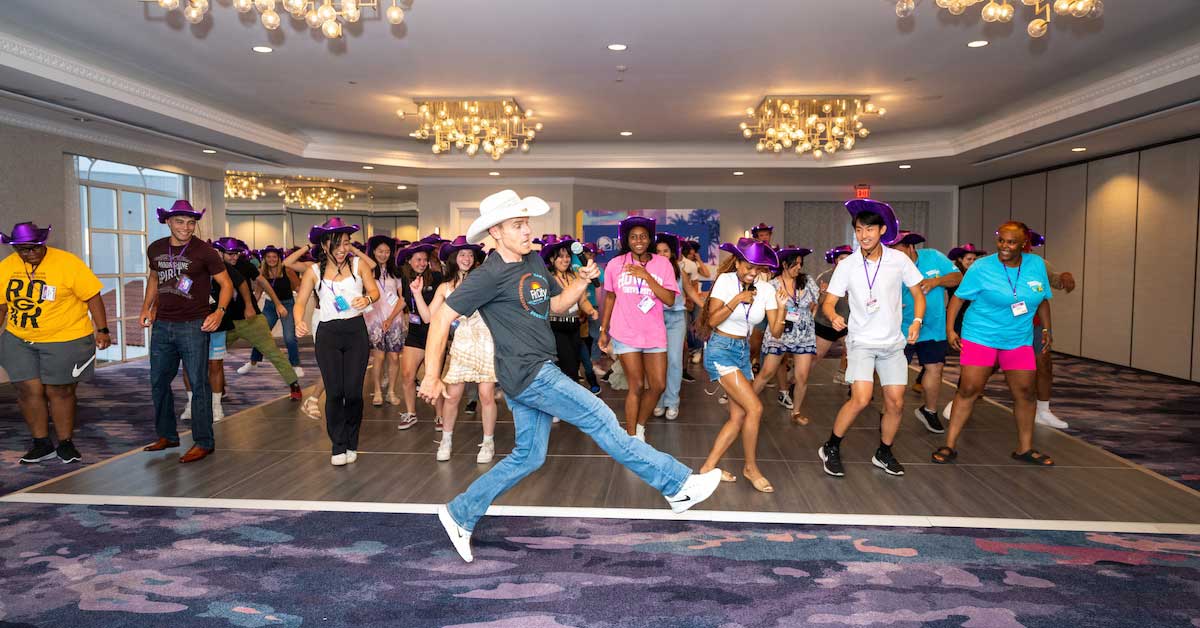Welcome to the first article in a series about mental health and wellbeing from Event Minds Matter, supported by MPI.
There was a time, not so long ago, when discussing mental health was taboo.
It was never short listed for a professional development day or anticipated content for newsletters, magazines or podcasts. So, what changed? The stigma that masked millions of people around the world has been peeling off little by little, making room for conversations that go to the root of the problem. Join MPI and Event Minds Matter as we explore the solutions, ideas, resources and authentic stories of what is propelling a younger generation to choose careers with companies that practice the culture of kindness and care.
PART ONE: It’s not therapy, it’s mental fitness
The subject of mental health amongst event professionals is slowly moving more out in the open, lifting the stigma for some who have taken the steps to become mentally fit. Just look to LinkedIn as an example of the honest and transparent storytelling, the podcasts, the webinars and education being offered by associations, conferences and meetings across the continent. Hats off to the media who have given space within their digital magazines, newsletters and voices to help advocate for change. It was only two-and-a-half years ago that this subject was paid lip service and often swept under the rug in favor of unhealthy work habits that, for years, felt normal to most. You know what I’m talking about: That label we all wear as a badge of honor for being No. 6 on the most stressful job list.
But thanks to a combination of voices across all borders, the health and wellbeing of event professionals is becoming one of the most important priorities for businesses today. At Event Minds Matter, a community of event professionals have joined hands because you can’t comprehend the industry unless you have been part of it. We all know the struggle, challenges and late hours that one accepts in this field of work. We are also aware that this industry needs a voice of reason when it comes to mental health and wellbeing. We want new event professionals to thrive.
Proactive wellness is a choice that is consistent with one’s personal growth and productivity. A mentally fit workforce is the only way that you can take a generation from good to great. Taking care of your mental health is top of mind for many but even more important to Gen Z who are looking for benefits such as free therapy for employees and their families, mental health days, flexibility to work from home and a culture of leaders who don’t dance around the topic. Employees want to know that their leaders are listening, but this is just one part of the equation.
A recent Deloitte Insights study found that companies now recognize the need to invest more in the holistic health of their employees, because it’s clear that workers are fed up with outdated norms like the nine-to-five schedule, the expectation that they should be “always on,” substandard wages and benefits and the idea that they should be willing to sacrifice their health and their personal lives for their job.
“Thanks to a combination of voices across all borders, the health and wellbeing of event professionals is becoming one of the most important priorities for businesses today.”
C-suite executives themselves are not immune. Although far less attention has been paid to wellbeing among the C-suite—how they’re faring, the increased demands placed upon them and whether these factors are influencing their desire to stay in their leadership roles. Some recent research shows them departing their roles more rapidly.
And as we’ve seen with the Great Resignation, many people are no longer willing to tolerate jobs that leave them unhappy and in a constant state of stress and fatigue. Indeed, there’s been a notable power shift over the past few years, with workers demanding more from their employers than ever before and companies scrambling to adapt their employee value proposition to avoid a looming talent shortage.
How can C-suite leaders improve the wellbeing of their employees and themselves? To understand these issues and trends better, Deloitte partnered with independent research firm Workplace Intelligence to survey 2,100 employees and C-level executives across the U.S., the U.K., Canada and Australia. The survey results revealed eye-opening findings, including that nearly 70% of the C-suite are seriously considering quitting for a job that better supports their wellbeing.
In fact, Deloitte uncovered that both employees and the C-suite are struggling to prioritize their wellbeing—and for most people, work is to blame. However, executives are significantly overestimating how well their employees are doing and how supported they feel by their leaders. And there are other disconnects as well, indicating that the C-suite should be doing much more to understand the needs of their workers and demonstrate that they truly care about their holistic wellbeing.
“And as we’ve seen with the Great Resignation, many people are no longer willing to tolerate jobs that leave them unhappy and in a constant state of stress and fatigue.”
Fortunately, Deloitte’s research confirmed that health-savvy executives have the ability to turn things around and reimagine wellbeing for themselves and their people. But it won’t be easy, and they should consider relying on other leaders and health experts to help chart a new path forward for wellbeing at work.
It’s well known that the pandemic has had a negative impact on our collective mental and physical health. Wellbeing may now be at an all-time low among both the C-suite and rank-and-file employees. Research findings show that more than three-quarters of the C-suite (76%) said that the pandemic has negatively affected their wellbeing, and fewer than two out of three employees rated various dimensions of their health as “excellent” or “good.”
Having just attended an association conference to speak about mental health, I found myself in many conversations, but this one stood out in my mind as worthy to share. A woman who works with a team of 30 colleagues spoke about her new manager, who arrived at the time these employees were being called back to work. He sent them all an anxiety webinar to watch and help them prepare for the return to the office. This is what Event Minds Matter calls dismissive behavior. Let’s reframe what might have happened in a mentally fit environment. He could have sent a survey asking the right questions about how they felt about coming back to work. This act of kindness would have garnered a more favorable response.
I know many of you reading this may or may not agree with what he did, but no one is asking him or you to be a therapist. It is not the responsibility of the workplace to recommend a course of treatment for any condition, be it mental or physical. However, when someone is suffering, I believe leaders should ask whether the employee has a plan to improve their situation. Normalizing mental health in the workplace requires leaders to demonstrate the same level of concern and support for their team’s mental and physical health. When employees speak up, they shouldn’t simply be given words of support and then left to resolve their issues independently. Moving forward, leaders must approach conversations about mental health with compassion and empathy. From my perspective, neither is possible if support ends at simply acknowledging these challenges exist.
SUBHEAD: Bridging the gap between understanding and action
Now, to be fair, most managers are not mental health experts, but they can connect employees with the resources to learn about and manage their mental health. To help eliminate the stigma around mental health, business leaders must embrace their role as a bridge between acknowledgment and education. Here are three strategies leaders can implement to truly support employees’ mental fitness at work.
1. Take a peek under the surface
When employees bring their mental health challenges to your attention, dig deeper to identify any work-related factors that could be contributing. This doesn’t mean taking on the role of clinician. Instead, employers should draw clear lines between where the role of “boss” and “therapist” begin and end to tactfully inquire about their employees’ wellbeing and gain clarity into their plans for coping.
For example, at face value, you might think an employee who says they are anxious is just that: anxious. However, when you inquire further, you might learn their anxiety is related to workplace stressors. In some companies, they’ve employed pulse surveys to get a real-time reading of how the employees are doing and where they can lean in to bolster support.
Engaging with employees more deeply encourages them to seek solutions and provides insight into how you can better support them, whether that is making changes to your office and culture or addressing foundational flaws within your organization that fuel these problems.
2. Recommend educational resources
Awareness is a critical factor in employees’ ability to manage their mental health, from recognizing they are stressed or burned out to understanding where they can seek help. Employers are already making strides in getting employees talking about their mental health. Now, we have to shift focus to connecting employees with educational resources. This includes providing in-house wellness programs, factsheets, research and information on different conditions; contact information for mental health professionals and helplines; and programs where experts offer insight into strategies for managing mental health.
3. Provide access to tools and programs
The final component to round out your strategy for supporting employees’ mental health is continuing to offer wellness initiatives and programs that empower employees to take charge of their mental health. Through benefits geared toward positive mental health—such as mental health app subscriptions, yoga or meditation classes, therapy memberships and employee resource groups that connect employees with others who have been in their shoes—leaders can ensure their employees receive 360-degree support on their mental health journey.
To successfully embrace mental fitness in the workplace, it’s imperative that leaders make it OK to recommend reading, resources and programs, as well as encourage employees to find the right solutions for managing their mental health struggles. As leaders, that begins by proactively working to destigmatize mental health. One of the most meaningful steps we can take toward this goal is to stop celebrating acknowledgment alone. Stop celebrating bad behavior like working till 3 a.m. to finish an RFP and then coming in the next day and being acknowledged in front of employees who chose not to do the same.
Like any exercise, mental fitness is what Gen Z is hunting for. Reinvent your policies and procedures and watch your company build mindful muscle.
As an association, MPI has made it a priority to discuss mental health and wellbeing with their members, raising the lens on a subject that is critical to the survival of the industry. MPI practices kindness and is moving forward with a mandate of caring leadership that will help propel the next generation of event minds to have a safe place to share and build confidence, professional development, networking and a sense of belonging. This association is practicing mental fitness and we are going to get louder and more mentally fit in the years to come.
A NOTE FROM MPI: Mental fitness in action
Social wellness is often a concept defined by networking, social events and all the things we “do” amid the busy-ness of life. However, social wellness has a greater currency beyond social networking—the value of spaces and places that embrace and uplift people’s most authentic selves is at the heart of social wellness. Join MPI for our first installment of Destination: YOU where we explore how wellness, identity and authenticity intersect to create meaningful change for individuals, within our events and within ourselves. Register here for free.



.jpeg?sfvrsn=96553155_2)



